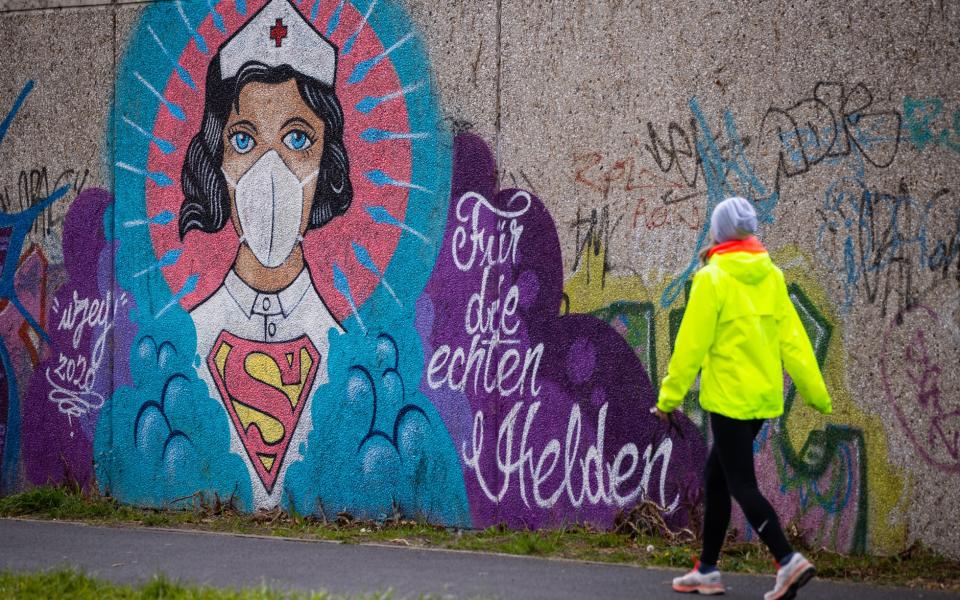Here in Germany we're winning the fight against Covid – for now

It’s been a rollercoaster few weeks here in Germany, as the coronavirus figures have started to steadily climb again and new lockdown curfews have been imposed on several cities and regions including Berlin, Frankfurt, Munich, Cologne, Bavaria’s Berchtesgaden Land.
Chancellor Angela Merkel has again urged all Germans to "avoid all unnecessary travel, and all non-essential gatherings," and stay home as much as possible. And on Wednesday evening, German health minister Jens Spahn tested positive for the virus.
Warning signs for a second wave began to emerge here around the middle of September, as infections exceeded 2,000 nationally for the first time in months. Between then and now, the figures have climbed to some 10,000 per day, as reported by the national health authority, the Robert-Koch Institute (RKI), in the last couple of days.
Merkel and the ministers of Germany’s 16 states have been in communication about what to do, though not always in agreement. Some states, presumably mindful of the counter-demonstrations that have broken out across the country (the largest, in Berlin, drew some 40,000 at the end of August), have opposed any kind of tightening measures.
The eventual compromise is the Hotspot Strategy, whereby only specific hotspots will endure curfews and stricter controls in order to avoid a nationwide shutdown. The criteria for such hotspots in Germany is 50 infections per 100,000 for seven days in a row, which has been superseded in many different places due to a mix of returning holidaymakers and superspreader events such as illegal raves and gatherings, and large weddings, according to reports.

The Westphalian city of Hamm, for example, suffered an intense spike due to a wedding that infected some 300 people, while Bavaria’s Bergeschter Land, which hit 273 per 100,000 lately, is rumoured to have been caused by a 50th birthday party. Berlin, well known as a nightlife Mecca, has held various illegal (and legal) raves over the summer, which in combination with returning travellers from international hotspots, are said by the RKI to be the cause.
In Neukölln, a district of Berlin well known for its youthful party culture, the numbers have reached 171.3 infections per 100,000, with many other city districts – Mitte, Kreuzberg-Friedrichshain, Tempelhof-Schöneberg – also leaping way over the threshold. Subsequently, some federal states within Germany have told residents of these Berlin hotspot districts that they must quarantine before they are allowed to move around freely.
Stricter laws for the capital came into effect around October 8. These, so far, have meant more mandatory mask wearing, including in certain outdoor areas such as popular markets and streets; limits on all gatherings, so that only five people or people from two households are allowed to meet outside at night and indoor private gatherings can comprise a maximum of ten people; and stricter personal registrations at all cafes, bars and restaurants.
Nationwide advertising for Berlin as a tourist destination has been scrapped (just as the new airport is about to finally open after a long delay), and there has also been an alcohol ban between 11pm and 6am, though in an interesting development, a handful of Berlin bars appealed against the curfew and have had their rights held up in court – though they are only allowed to serve soft drinks after 11pm. Whether more bars will now follow suit remains to be seen.
That said, at the time of writing, the situation looks reasonably good compared to the UK and other nearby countries like France, Spain and the Czech Republic, which have around 20,000 new infections per day currently, and are facing much stricter lockdowns. Opinions on this scenario are divided, however. On one hand, many believe Germany to still be blessed with the mix of good fortune, top-notch care facilities, and clear leadership that helped keep the first wave relatively low.
On the other, many believe complacency to be dangerous, including Berlin’s own city mayor Michael Müller, believe Germany is on the verge of losing control of the virus completely. German politician Karl Lauterbach, a health expert, member of parliament (SPD) and one of the country’s leading voices on the coronavirus, has also warned in an interview with Der Spiegel, that cases of Covid-19 are about to increase dramatically in Germany.
“In France and Spain, we have (also) seen that it hits younger people first, but the virus then spreads to older people,” he said. “This will also be the case in Germany. It will take another four weeks before more elderly people contract the disease, and then we will again be faced with more severe cases. And then it will take another four weeks until the first people who fell ill in that group die. I expect we will see an increase in deaths in six to eight weeks.”
Merkel recently told her citizens that if we take responsibility and obey the rules, we can imagine a time after Corona and “what a joy that would be“. Health minister Spahn is also hopeful that a vaccine will be available in the first quarter of 2021. But whatever happens in the longer-term future, it’s clear that the winter here and on the European continent is going to be a long and particularly dark one.

